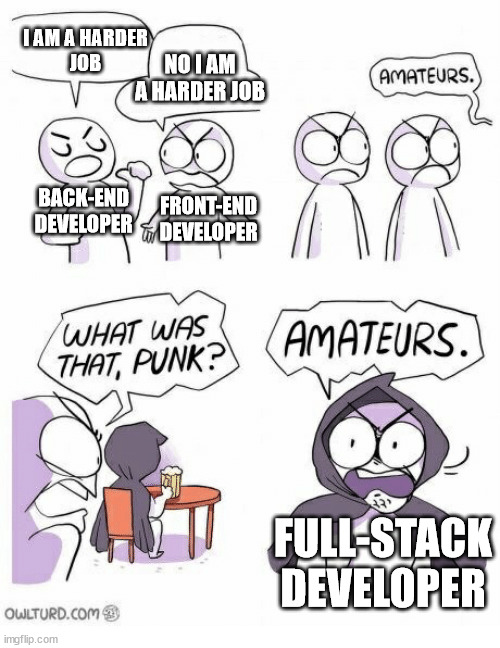Weird artificial distinctions of our time.
Programmer Humor
Welcome to Programmer Humor!
This is a place where you can post jokes, memes, humor, etc. related to programming!
For sharing awful code theres also Programming Horror.
Rules
- Keep content in english
- No advertisements
- Posts must be related to programming or programmer topics
All the full-stack devs I've worked with so far were just back-end developers who write terrible front-end code.
See, you should have worked with me - I write terrible back-end code too! You'd have gained a whole new appreciation for the people who can do at least that.
This feels like a personal attack
As a backend engineer who has experience with frontend I've learned it's two things
From an engineer's point of view, if they call themselves a full stack engineer they're usually a front end dev who have written a few apis in the past. No shame, but I've seen way too many people say they're backend without fully understanding what being a backend engineer really is in terms of scale, speed, and flexibility.
From q businesses point a view, a full stack engineer is a role they made up that means "we expect an expert in all areas but want to pay a lower rate".
Both areas need experts. I'd say I'm an expert in backend. I think it's impossible to be an expert in everything, and companies who want "full stacks" should expect jack of all trades master of none, and will attract literally any engineer, because what the hell is full stack.
I've probably pissed off a lot of fellow engineers, but I guess what I'm trying to say is be a master of your domain. Learn how frontend and backend work, but don't try to be an expert in everything. It's good to specialize. When you're asked if you are a full stack engineer it's perfectly fine to say "I have experience in the full stack, my expertise is on the backend, but I can do react when needed"
There are both kinds of full stack developers: the frontend dev that doesn't understand the backend enough to know they suck at it, and the backend dev that doesn't understand the frontend enough to know they suck at it.
I couldn't agree more with the latter part, I know a lot of backend engineers who consider frontend simple without ever trying what it really takes. This is not a healthy way to view someone else's work, and it usually produces friction between back and front end teams
You can always spot them when they have to ask about state.
I always asked about state.
Backend engineer here who got gud at frontend because of mobile, but recognize others are way better than me at it.
So I do consider myself to be a true full-stack developer, since I do have 5+ years of experience working on each of server-side, CLI, desktop applications, and mobile applications and 10+ years on the web frontend. Then again, I’m 40 and I feel too old to get offended over that shit. I also agree the term “full-stack” is diluted as hell, so I don’t even call myself that anymore.
Now get off my lawn :p
Experience != expertise or skill. I have never met someone who was actually good at both. Maybe if your backend is just some SQL queries. I am a backend engineer and I’m adequate at front end but I’d never hire someone whose skills were merely adequate unless I thought they had the potential to reach ‘good’.
"Full-stack" 🤮
More like "I do two jobs but only get paid for one".
I was toldo the other day that in ten years there will be no testers because developers will do all the testing.
I've seen how it works out in practice: there's not enough time for testing and for developing, too, developers are going to burn and the product is going to be shit done and shit tested. Maybe it works if your company is willing to spend extra for less results by someone doing all the stuff less efficient than what they could, but that's a rare occurrence.
A full stack developer is either a back end developer that has no business writing front end code but does it anyway, or they’re a front end developer that has no business writing back end code but does it anyway.
Or they’re perfectly capable of doing both because they’re at a startup that’s years away from running at scale or having to worry about performance and security.
